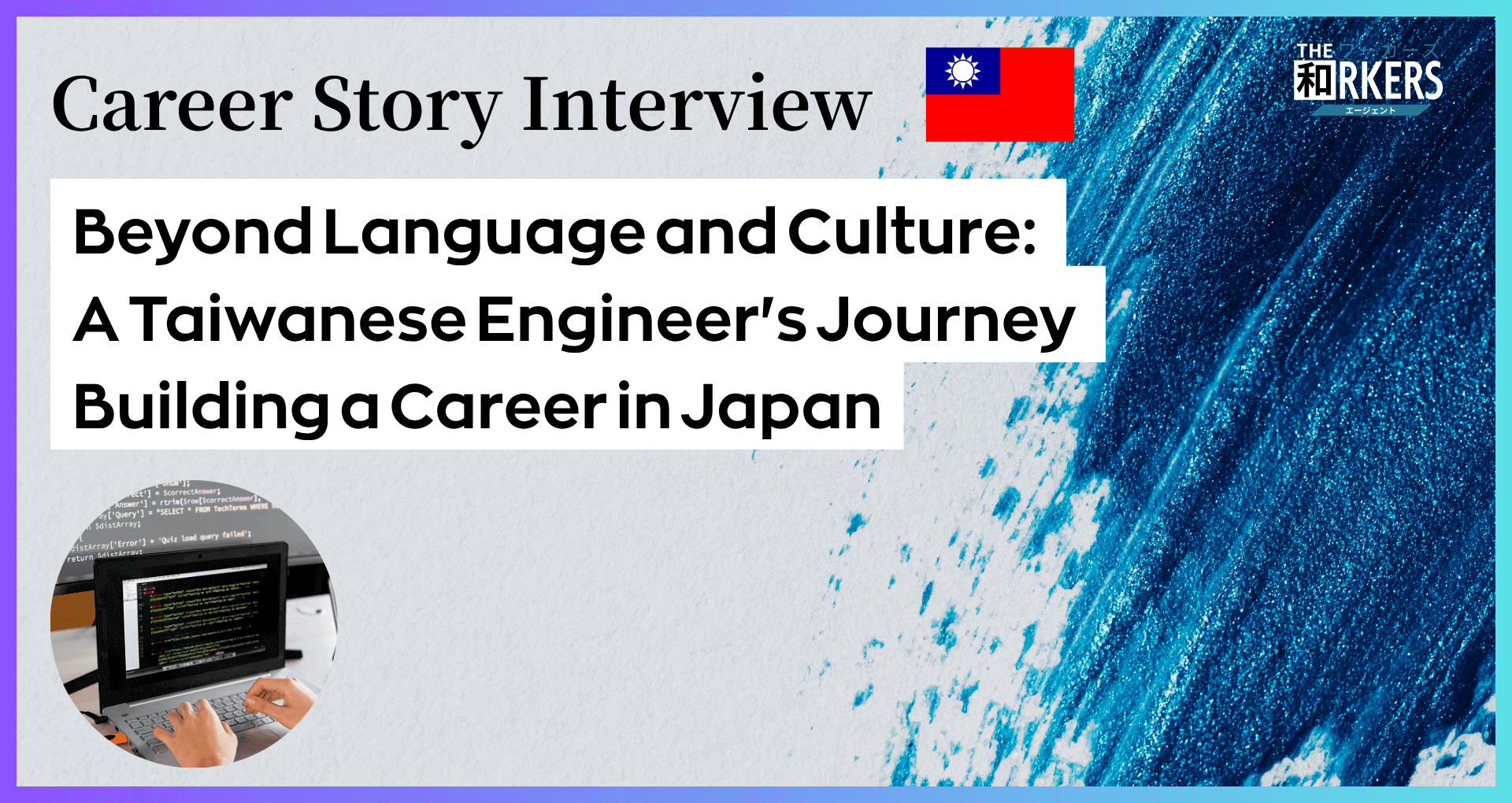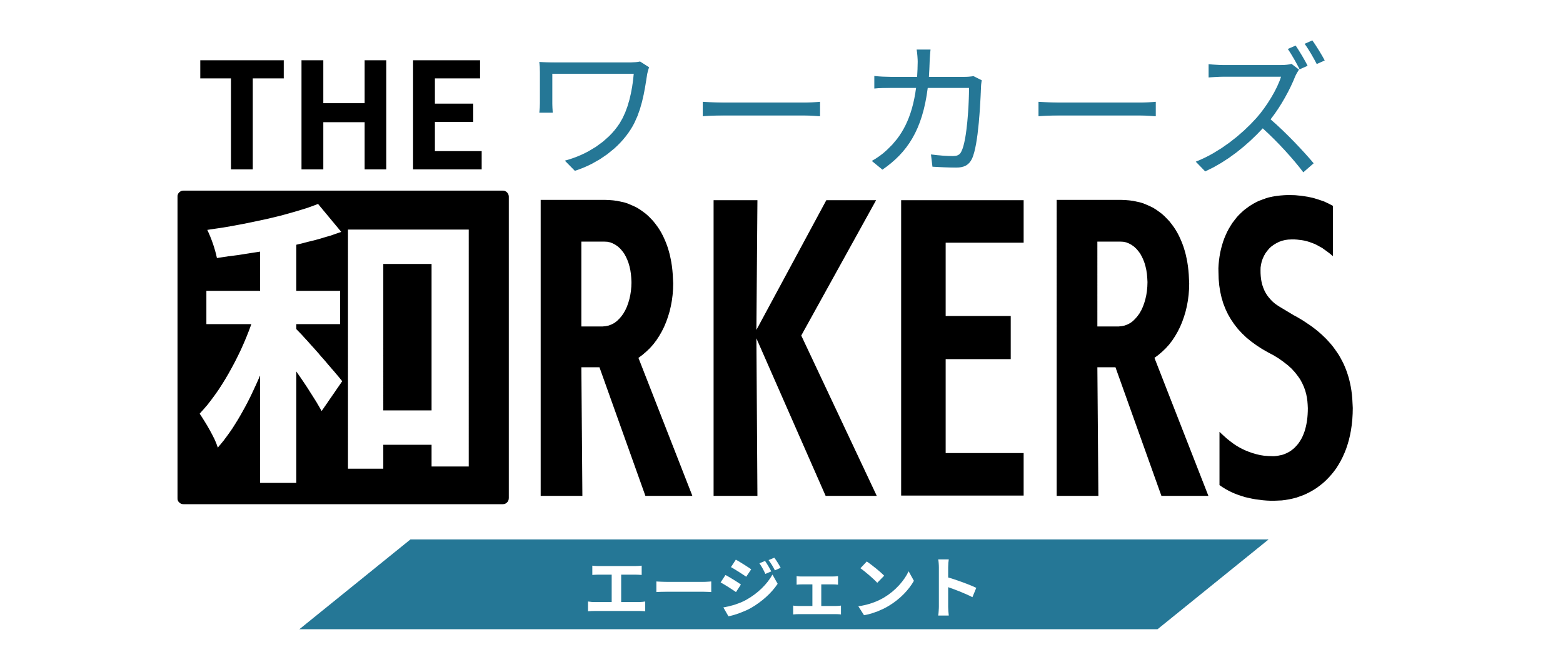Beyond Language and Culture: A Taiwanese Engineer’s Journey Building a Career in Japan

His journey with the Japanese language began in high school, sparked by a love for anime.
Originally from Taiwan, he majored in Japanese at university and spent a year on exchange in Japan before pursuing graduate studies at a Japanese university. Driven by a desire to stay in Japan longer, he launched his career as an IT engineer. From joining his first company as a fresh graduate, to changing jobs and stepping into a leadership role, he opens up about the challenges he faced, the growth he experienced, and what it truly means to build a career in Japan.
Discovering Japanese and Taking the First Step to Japan
— Could you briefly walk us through your background?
I’m originally from Taiwan and studied Japanese as my major at university for four years. In my third year, I joined a one-year exchange program at a university in Niigata, Japan—my first long-term stay in the country.
After graduating, I decided to pursue further studies and entered a graduate program in Osaka, where I focused on data analysis for two years.
At the time, many of my fellow international students were looking for jobs in Japan, and I also started thinking, “Maybe I’d like to stay here a bit longer.” That eventually led me to start my career in Japan.
After finishing graduate school, I joined an IT company in Osaka as a new graduate and worked there as an engineer for about four and a half years. Then in September 2024, I moved to an SIer company, where I currently work.
— Were you already fluent in Japanese as a student?
To a certain extent, yes. I passed the JLPT N2 level in my second year of university, so I was able to manage everyday conversations. During my exchange year in Niigata, I continued studying and eventually passed the N1 level.
Being immersed in daily conversations helped me naturally pick up more authentic expressions. I think that year abroad was when my Japanese improved the most.
That said, it wasn’t until I started working full-time that I truly acquired “usable Japanese.” Business communication—emails, meetings, and the appropriate use of honorifics—requires a different level of language skill. After joining the company, I made a conscious effort to study business Japanese more seriously.
— You went to graduate school in Japan. Did you already have plans to work here at that point?
Not really. When I started grad school, I didn’t have a concrete plan to work in Japan. I just wanted to keep studying Japanese and experience living here again. I also thought that graduating from a Japanese graduate school might open more options in the future.
I only started job hunting because other international students around me were doing it. It was more like, “I’ll give it a shot too.” Honestly, I wasn’t too serious at first—I figured I could always go back to Taiwan if it didn’t work out.
I could have gone to grad school in Taiwan as well, but my exchange year during undergrad was such a fun and memorable experience that I really wanted to come back. Since I had already put effort into learning Japanese, I felt motivated to improve it even further by continuing my studies in Japan.
— How did you study Japanese?
As a Japanese major, I learned the basics—grammar and vocabulary—through university classes. But outside of class, anime was actually the biggest influence. I’ve loved anime since high school and used to watch it almost every day. That’s what initially sparked my interest in the language.
Anime helped me get used to natural phrasing and intonation. Of course, it’s mostly casual speech and not suited for business settings, but in terms of getting comfortable with the language, it was incredibly helpful.
— Do you have any favorite anime?
I really like Hunter x Hunter. I also watched Slam Dunk and Attack on Titan a lot. These are pretty well-known even in Japan, right?
— Do you remember your first impression of Japan?
Yes, I do. My first visit was during my exchange year in Niigata, and the very first thing I thought was, “It’s so cold!” (laughs)
I arrived in October, just as autumn was setting in, and the temperature was much lower than in Taiwan—I was shocked.
But on the flip side, the food was absolutely delicious. I especially loved yakiniku and oyakodon—I ate them often!
Starting Out as a New Grad IT Engineer — Why He Chose to Work in Japan
— After graduate school, you started working at an IT company in Japan as a new graduate. What led you to choose that company, or even the IT industry in general?
To be honest, I wasn’t specifically targeting the IT industry from the beginning. During job hunting, I applied to companies across various industries. It just happened that the first offer I received was from an IT company.
What prompted me to apply was actually a Vietnamese friend from my graduate seminar. He had already received a job offer from that company and said, “Why don’t you try applying too?” I got lucky and was offered a position, so I decided to join.
— What kind of work did you do at that company?
It was primarily a contract-based development company offering system development and IT solutions. I was assigned to the Osaka branch, and the department I joined was responsible for training new employees and supporting other departments.
As a new grad, I started in that department myself—receiving training while helping out with various teams. I participated in different projects and supported other teams with development or operations as needed.
— What kind of technologies or programming languages did you use?
It depended on the project, but Java was the most commonly used. Sometimes we also used .NET languages. Each project involved different technologies and industries, so we had to stay flexible—but that variety was actually what made the work interesting for me.
— What challenges did you face as a working professional in Japan for the first time?
The hardest part was definitely adapting to the Japanese workplace practice of “Hō-Ren-Sō”—which stands for Hōkoku (report), Renraku (communicate), and Sōdan (consult).
As a student, I wasn’t used to proactively reporting things, so at first I struggled with that. I remember times when I hadn’t updated my manager on my progress, and they would suddenly ask, “What’s the status?” That’s when I realized I should have communicated more proactively.
This is something very specific to Japanese work culture. Of course, each manager has their own preferences about how and when to report, so learning to “read the air” and adjust accordingly was tough at first.
But after a few experiences of being firmly reminded (laughs), I started to get a feel for the right timing and content for updates. Nowadays, I make an effort to report progress more frequently and clearly.
“Is This Really Right for Me?” — Why He Considered a Career Change and What He Found in a New Environment
— You mentioned changing jobs last year. What made you decide to leave your first company?
The biggest reason was that I wanted to try something different.
My previous company focused mainly on contract-based development. Although the clients and systems varied from project to project, the languages we used and the way we worked didn’t change much.
Over time, I began to wonder, “Is this really okay for me? Do I want to keep doing the same kind of work?” That feeling gradually grew stronger.
— Did you feel that the work itself wasn’t the right fit for you?
Yes, that’s right. As I continued doing the job, I started to feel like it might not really suit me.
Around my third or fourth year, I realized I wasn’t enjoying the work as much as before. Even when I was busy, I just didn’t find it fun anymore.
As that feeling built up, I began thinking seriously about changing my environment and finding a job that felt more aligned with who I am.
— How did you go about finding companies to apply to in Japan? Did you use any job agents?
Yes, I used a few job sites and recruitment agencies.
I tried out several platforms and ended up focusing on the ones that felt like a good fit for me.
The company I currently work for was actually one I found through one of those sites. I saw their company profile and felt interested, so I applied. I was quickly invited for an interview, and after meeting with them, I really liked their company culture and flexible work style—that’s what ultimately made me decide to join.
— What did you find most challenging about job hunting in Japan?
The interviews, without a doubt.
Preparing for them was a lot of work. I had to research each company thoroughly, come up with answers to likely questions, and make sure I could communicate my thoughts clearly.
Anticipating what might be asked and getting ready to respond confidently takes practice, and since I wasn’t used to it, it felt pretty tough at first.
— Did you receive any support from recruiters?
Yes, the recruiter I worked with provided materials outlining frequently asked interview questions, and they also shared insights about what kind of candidates the companies were looking for.
That information really helped me focus my preparation and gave me a bit of reassurance before going into interviews.
Growth Through Navigating Japanese Workplace Culture
— What kind of work are you currently doing?
Right now, I’m working as a project leader (PL). When I first joined the company, I mainly handled maintenance of existing systems. But now I’ve moved into a new phase, working on a development project that involves adding new features to an agriculture-related system.
Building on the foundation of the existing system, we’re designing and implementing new functionality. I’m responsible for managing the project’s progress and assigning tasks to team members.
— What’s the size and structure of your project team?
There are about five people on the team. It’s not a large-scale project, but because of the small size, each member has significant responsibilities, which creates a strong sense of ownership.
I’m currently the only non-Japanese member of the team—everyone else is Japanese.
— Since this is your second company in Japan, were there any new challenges you faced after switching jobs?
Yes, the biggest difference I felt was in the interpersonal relationships.
At my first company, I joined as a new graduate, so I had a lot of peers from the same cohort, including some friends from graduate school. It was easy to talk to people, and there was a natural sense of camaraderie.
But since I joined my current company as a mid-career hire, those kinds of horizontal connections weren’t already in place.
Of course, communication at work has been fine, but casual small talk or social interaction outside of tasks was limited in the beginning, and I sometimes felt a bit isolated.
There were a few other mid-career hires, but since we were placed in different departments, we didn’t have many chances to see each other. I think that’s one of the unique challenges of joining a company mid-career.
— I imagine the work style is also different from your first job. What do you find fulfilling in your current role?
I’ve only been in my second job for about six months, but I already feel a stronger sense of purpose.
Being entrusted with a project leader role has been a big part of that.
There are many situations where I have to make decisions on my own, and having that responsibility makes the work more meaningful.
For example, when we receive urgent requests or questions from clients, I’m the one who gathers the information, makes the decisions, and responds directly.
Being trusted to handle that process from start to finish gives me a real sense of ownership and growth.
At my previous job, I also interacted with clients, but usually through my supervisor. Now I’m at the front line, dealing with clients directly, which gives me greater autonomy and responsibility.
— Are there any challenges you’re currently facing in your work?
Yes, being in a leadership position, I feel the weight of responsibility more than ever.
Whether a project succeeds or fails often comes down to how well I manage it, so there’s definitely pressure.
If I don’t keep information organized or track progress properly, it could directly lead to delays or quality issues.
Managing those aspects consistently is an ongoing challenge for me.
— What do you do to overcome those challenges?
First, I make sure to check on the team’s progress every day without fail.
Having a constant grasp of where the project stands helps me catch issues early and give clear direction to my team.
I also place a lot of importance on smooth communication.
Since Japanese isn’t my native language, small misunderstandings in nuance can sometimes lead to problems, so I try to be extra careful with confirmations and information sharing.
— Looking ahead, do you have any personal or professional goals for your life in Japan?
Yes, my biggest goal right now is to obtain permanent residency in Japan.
Based on my experience so far, I feel that both the lifestyle and work culture here suit me well, and I want to continue living here long-term.
As for my career, I’m currently working as a project leader, but I’m still exploring what direction to take next.
I haven’t fully decided whether I want to go further down the management path or focus on deepening my technical expertise—both are appealing, and it’s not an easy choice.
Ideally, I’d like to pursue both in some way.
There’s a unique satisfaction in leading a team as a manager, and also a rewarding challenge in continuously learning as an engineer.
I hope to gradually develop skills in both areas and eventually find the path that suits me best.
To Those Hoping to Build an IT Career in Japan
— Lastly, do you have any advice or messages for non-Japanese professionals who want to build an IT career in Japan?
The biggest barriers to working in Japan are language and culture.
In particular, Japanese is absolutely essential for day-to-day communication in the workplace.
To work at a Japanese company, being able to communicate naturally in Japanese—at least to a functional level—is pretty much a basic requirement.
It’s also important to be able to adapt to Japanese work culture. The way people work, build relationships, and follow workplace rules like Hō-Ren-Sō (reporting, communicating, consulting) is often very specific to Japan. Understanding and accepting those differences is key.
So if you’re thinking about working in Japan, my advice would be: First, make a solid effort to study Japanese. Second, take the time to research Japanese work culture and practices. Only after that, decide whether this environment truly suits you—it will make it much easier to sustain your career in the long run.
As for me, I don’t have plans to return to Taiwan, except for an annual visit to see my family. I see my future—both life and career—continuing here in Japan. In that sense, I believe choosing to work in Japan was the right decision for me.
\Software Engineers, IT Consultants, Data Scientists…/

Non-Japanese and aiming for a top-tier job in Japan?
Get in touch with THE 和RKERS Agent today.



Software Engineers,
IT Consultants,
Data Scientists…

Non-Japanese and aiming for a top-tier job in Japan?
Get in touch with THE 和RKERS Agent today.
